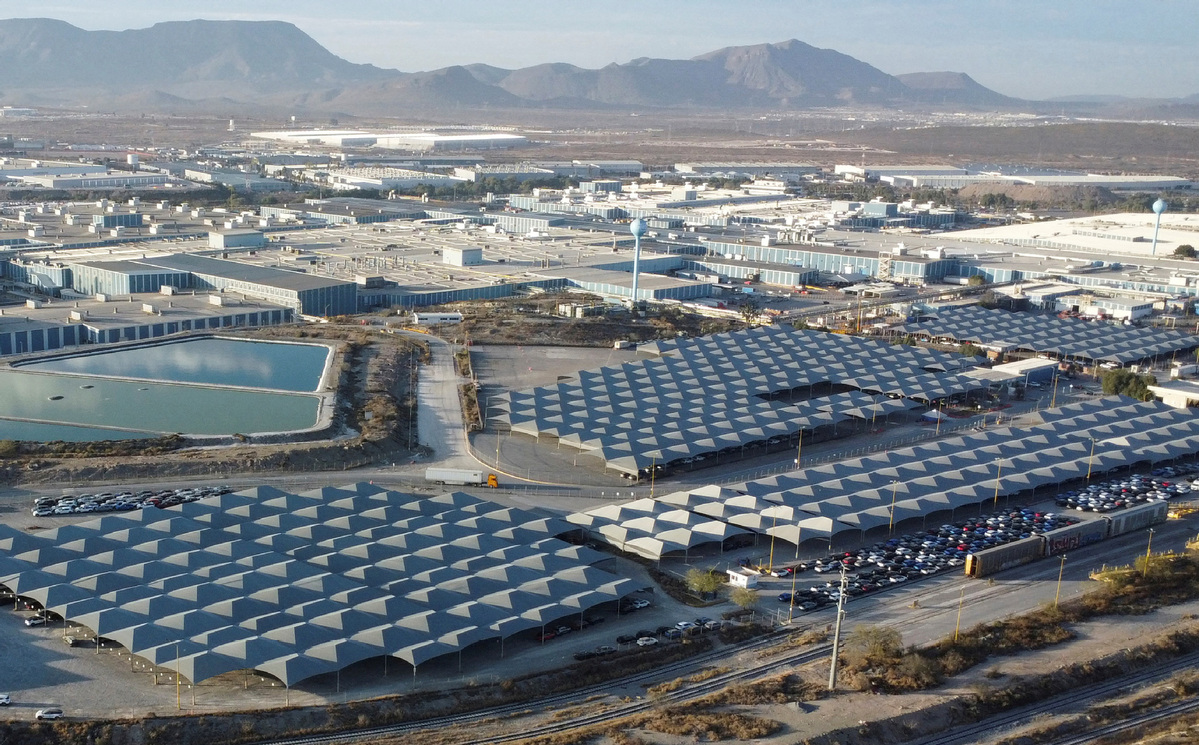
FILE PHOTO: A drone view shows the General Motors plant, which exports vehicles to Canada and the US, in Ramos Arizpe, Mexico Jan 29, 2025. [Photo/Agencies]
United States President Donald Trump's announcement of a 25-percent tariff on imported vehicles, set to take effect next week after months of threats, has sent global automaker stocks tumbling.
The move, which was unveiled on Wednesday and that effectively puts a wall of tariffs around the US automotive sector, sparked an immediate selloff of auto stocks as investors reacted to worries about the impact on global trade and industry profits.
The protectionist measure threatens to disrupt nearly half of US auto sales and strain relations with key allies who export $474 billion of automotive products annually.
Mexico stands to lose the most from the new policy, having exported 2.5 million vehicles to the US in 2024, nearly twice as many as its closest rival, South Korea.
Japan, Canada, and Germany would also face major impacts, with combined exports of 2.8 million vehicles last year.
The tariffs extend beyond finished cars to include major components such as engines and transmissions, the White House confirmed.
Since most US cars use foreign-made parts, the tariff will increase production costs, leading to higher car prices for consumers, reported Reuters.
European Commission President Ursula von der Leyen described the move as "bad for businesses, worse for consumers".
"We will now assess this announcement, together with other measures the US is envisaging in the next days," she said. "The EU will continue to seek negotiated solutions, while safeguarding its economic interests."
Hildegard Muller, president of the German Association of the Automotive Industry, denounced the tariffs as a "fatal signal" for global trade.
"The risk of a global trade conflict, with negative consequences for the global economy and growth, prosperity, jobs, and consumer prices, is high on all sides," Muller said, urging US-EU negotiations be conducted to resolve the dispute.
The United Kingdom's auto industry representative criticized the tariff decision. Mike Hawes, who leads the Society of Motor Manufacturers and Traders, said it was "not surprising but, nevertheless, disappointing" and called for diplomatic intervention to prevent further economic damage.
"If, as seems likely, additional tariffs are to apply to UK-made cars, it's a blow to a long-standing and productive relationship," he said.
On Thursday, Trump warned the European Union and Canada against working together on retaliatory measures, threatening higher tariffs "far larger than currently planned" in response if that happens.
By making imported vehicles and parts more expensive, Trump aims to incentivize automakers to move more manufacturing to the US, with the idea that higher tariffs will make it cheaper for companies to build cars in the US rather than elsewhere.
"This is the beginning of Liberation Day in America," Trump said on Wednesday. "If you build your car in the United States, there will be no tariff. For the most part, I think it's going to lead cars to be made in one location."
The Financial Times cited a US official as saying revenues from the tariffs would be used to give "the largest tax cut in American history".
The tariffs are certain to impact the operational dynamics of the global automotive industry, particularly in North and Central America, according to investors.
"Mexico, Japan, South Korea, Canada, and Germany are the biggest suppliers of auto-related products to the US and stand to lose out if Trump doesn't back down," said Russ Mould, investment director at AJ Bell Group. "It's another blow to relations between the US and the rest of the world, and a further reason for investors to be gloomy."
Shares in US giants GM and Ford dropped 7 percent and 4 percent in the New York Stock Exchange on Wednesday, while major foreign brands including Volkswagen, BMW, Toyota, and Hyundai fell between 2 and 4 percent in European and Asian markets early on Thursday.
The auto tariffs are part of Trump's broader trade offensive conducted since January, which includes a 20-percent levy on all goods from China and 25 percent on all steel and aluminum imports.
China's Foreign Ministry condemned the new tariffs on Thursday and warned that trade wars benefit no one.